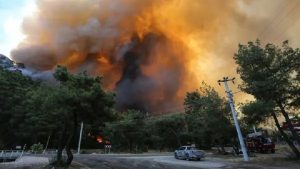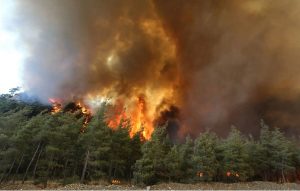01-08-2021
ANKARA: Turkish President Recep Tayyip Erdogan has declared parts of southern Turkey ravaged by wildfires as “disaster areas”, with the death toll from the fires rising to six after two forest workers were killed.
 Fires across Turkey since Wednesday have burned down forests, encroaching on villages and tourist destinations and forcing people to evacuate.
Fires across Turkey since Wednesday have burned down forests, encroaching on villages and tourist destinations and forcing people to evacuate.
Minister of Agriculture and Forestry Bekir Pakdemirli said on Saturday that 88 of 98 fires that broke out amid strong winds and scorching heat have been brought under control.
At least five people have died in Manavgat and one died in Marmaris. Both towns are located on the Mediterranean and are tourist destinations.
Health Minister Fahrettin Koca said 400 people affected by the fires in Manavgat were discharged from hospitals and 10 were still receiving treatment. In Marmaris, 159 people were treated and one person was still undergoing treatment for burns.
New fires erupted in southern Hatay province where flames jumped to populated areas but appear to have been brought under control.
Turkish media said hotel guests in parts of the Aegean town of Bodrum were told to evacuate and authorities called on private boats and yachts to assist in evacuation efforts by sea.
 President Erdogan was visiting affected areas on Saturday, inspecting from a helicopter.
President Erdogan was visiting affected areas on Saturday, inspecting from a helicopter.
Erdogan declared the regions affected by the forest fires “disaster areas” in a statement on Twitter.
“We will continue to take all necessary steps to heal our nation’s wounds, compensate for its losses, and improve its opportunities,” said Erdogan.
Speaking from the town of Manavgat, in the south of Turkey, Erdogan said at a press conference later on Saturday that while Ankara was not looking to politicize the incident, it was also “considering the possibility of sabotage” and an investigation was under way to determine the causes of the fires.
Turkey has blamed some previous forest fires on arson or outlawed groups such as the Kurdistan Workers Party (PKK).
Erdogan said the government would provide compensation for families who lost their homes or agricultural lands. He said taxes, social security and credit payments would be postponed for those affected and small businesses would be offered credit with zero interest.
 “We cannot do anything beyond wishing the mercy of God for the lives we have lost but we can replace everything that was burned,” he said.
“We cannot do anything beyond wishing the mercy of God for the lives we have lost but we can replace everything that was burned,” he said.
Erdogan said the number of planes fighting the fires had been increased from six to 13, including planes from Ukraine, Russia, Azerbaijan and Iran, and that thousands of Turkish personnel as well as dozens of helicopters and drones were assisting the firefighting efforts.
Speaking from Antalya, Resul Serdar said there are still active forest fires in at least 10 locations in Turkey.
“Erdogan said that huge efforts are in place to bring the fires under control. Yet it is still very difficult … fires keep erupting,” Serdar said.
Wildfires are common in Turkey’s Mediterranean and Aegean regions during the arid summer months.
More than 2,600 fires have erupted each year on average in the last decade, but that figure jumped to almost 3,400 last year, said Husrev Ozkara, vice-chair of the Turkish Foresters Association.
A heatwave across southern Europe, fed by hot air from Africa, has led to wildfires across the Mediterranean.
 Temperatures in Greece and nearby countries in southeast Europe are expected to climb to 42 degrees Celsius (more than 107 Fahrenheit) on Monday in many cities and towns and ease only later next week.
Temperatures in Greece and nearby countries in southeast Europe are expected to climb to 42 degrees Celsius (more than 107 Fahrenheit) on Monday in many cities and towns and ease only later next week.
Experts have said climate change is fuelling extreme weather events around the world, including wildfires and floods.
Mark Diesendorf, an associate professor at the University of New South Wales in Australia, told media that climate change is producing heatwaves and droughts, which in turn creates dry vegetation that more easily ignites large fires.
“Very often most of that ignition is caused by lightning … and then you have a firestorm,” he said. “The best job the politicians can do now is to respond and mitigate climate change, which is the main, driving factor that’s increasing the severity and the frequency of these wildfires and also of floods.” (Int’l Monitoring Desk)
 Pressmediaofindia
Pressmediaofindia




